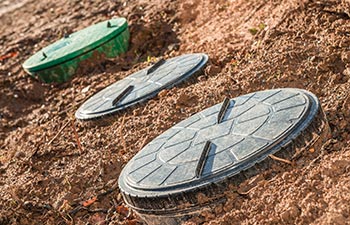
Bleach is one of the most time-tested and popular products for household cleaning. Not only is bleach affordable, but this chemical cleaner is known for being highly effective at removing stains as well as killing germs, mold and bacteria on a wide range of surfaces. However, this versatile product may be doing more harm than good if you have a septic system and are putting it down your drains. Here is a closer look at why septic users should be careful with bleach.
If you have a septic system, such as a septic tank, then you will find that all recommended maintenance involves avoiding the use of a range of chemical substances, including bleach. Septic tank users are generally recommended to avoid any practices that could be harmful to the environment, such as monitoring how much water you use, avoiding using too much soap, and knowing which chemicals are dangerous.
Why is bleach harmful to my septic system?
Bleach is among many harsh chemicals that should be avoided if your home or business relies on a septic system. maintenance and environmental standpoint, using bleach is not recommended. Understanding the reason behind this rule involves understanding what makes your septic tank operate effectively.
Septic systems rely on a natural biome to help break down the wastewater that gets flushed down your drains. This natural biome contains a variety of “good” bacteria that can break down materials such as organic waste, soap and many other contaminants. While you may love the way bleach can kill off germs inside your toilet, you won’t love the way it disrupts the function of your septic system once this chemical hits your tank. Unfortunately, bleach does a great job of getting rid of the both the bad and good bacteria. In your septic tank, this can disturb the balance of bacteria, or threaten that natural biome that helps it operate properly. Therefore, bleach is considered a major risk to your septic system’s efficiency.
Efficiency is not the only issue with bleach and your septic system. If your tank can’t break down the waste like it needs to, the waste will accumulate or build up. Once solids clog your tank, you are vulnerable to a host of issues such septic overflow, rupture and backups that can contaminate groundwater and damage your property. Keep in mind that having bleach in your septic tank can also result in this harsh chemical leaching out into your drain field and surrounding groundwater, which becomes an environmental health hazard.
A Safer Way for Septic Owners to Clean
If you can’t use bleach, it doesn’t mean you have to live with a dirty house. The good news is that there are “septic safe” cleaning products available for your use. Commercial drain cleaners can be safe in very small quantities but can also lead to corrosive effects. The best way to clean is with natural cleaning agents such as lemon juice and vinegar mix.
For more tips on keeping your house clean while protecting your septic system, call the experts of Metro Septic.

